 This month’s article is based on an extract from a little known source which highlights a period of extreme social discontent in our area. The writer of the extract was H. D. Davies the Head Teacher of Abermorddu School (1883-1910) who kept a School Log but also a scrap book which provides a snapshot of life in the Abermorddu area in the last decade of the nineteenth century. This particular extract can be found in records kept in the Local History Archive at Hope Community Library. It is one of a number of interesting items which can be attributed to the hand of this scribe of Abermorddu. The actual extract describes the action taken by striking miners at Llay Hall Colliery during August of 1893 and conveys a picture of menacing direct action by a workforce. “August 1893 – On Friday 12th an organised raid on Llay Hall took place at 9.30pm. Throughout the afternoon men, women and children assembled in the vicinity. Bodies of men, some 400 strong, marched five deep, towards the colliery. Some 60 or 70 youths armed with sticks and stones rushed forward destroying all glass. One large water barrel and a trolley tub were thrown down the shafts. One miner was injured.” The account is very similar to an account which appeared in the Carnarvon and Denbigh Herald and South Wales Independent on 18th August 1893. As a learned man H. D. Davies did actually submit articles to newspapers and he may have been the author of the article. He may also have been an eye-witness to the event. As Head Teacher of the local primary school he will have been in daily contact with the children of miners, and their parents, and will have had his finger on the social pulse at the time. The wider context and explanation for these disturbances is to be found in the impact of the economic depression of the 1890s on the mining industry. The Llay Hall Colliery had come under the management of Mr E. Stanley Clark in 1885. He was considered to have been a remarkable man who had actually begun the sinking of the pit shaft, as an engineer, a decade earlier. At first the colliery prospered but the depression took its toll regardless of the ability of colliery managers. In line with other colliery owners Mr Clark decided it was necessary to have a 17% reduction in wages in order to maintain profitability. One can imagine the sheer misery of miners whose wages was never high. Life was a constant struggle to pay the rent and put food on the table. It is only in retrospect that we are able to see the overarching causes of the recession. The mine owners and the pits themselves were an immediate target for an embittered workforce. Looking through H. D. Davies’ notes we can see how the story developed. The community rallied round to support local miners and their families. The Independent Chapel collection, raised during the Harvest Festival, was given to distressed families due to the strike. The publican of the Red Lion, Ffrwd, gave away 100 loaves of bread and Mrs Trevor-Roper of Plas Teg Hall and Mrs Kyrke of Nantyfrith Hall joined forces to organise a soup kitchen in the Caergwrle Drill Hall (now the Social Club.) By October of 1893 a locally organised Relief Committee was helping 70 families with three pennies a week for adults and one and a
half for children. H. D. Davies recorded the end of the strike in the course of October. The workers had to go back on the ‘old terms, pending a general settlement’, which presumably meant those involving the 17% cut in wages. Mr. Clark, the colliery manager, was awarded £39 ‘for damages caused by a riotous crowd’. Someone had paid the price for the episode and it looks like nothing had been achieved. The account is but one that can be culled from the jottings made by the Abermorddu Head Teacher. There are numerous other stories that could be told and this source is but one that resides in the Local Heritage Archive that is now available for public examination at Hope Community Library. The views expressed in this article are those of the author and do not reflect the policy of either Flintshire County Council or Hope Community Council. Readers are welcome to contact the author with any news or views on the local heritage at [email protected] or by telephoning 01978 761 523.
0 Comments
|
AuthorDave Healey Archives
December 2020
Categories |

 RSS Feed
RSS Feed